小学微课小升初英语知识点精讲情态动词
- 格式:pptx
- 大小:775.11 KB
- 文档页数:13
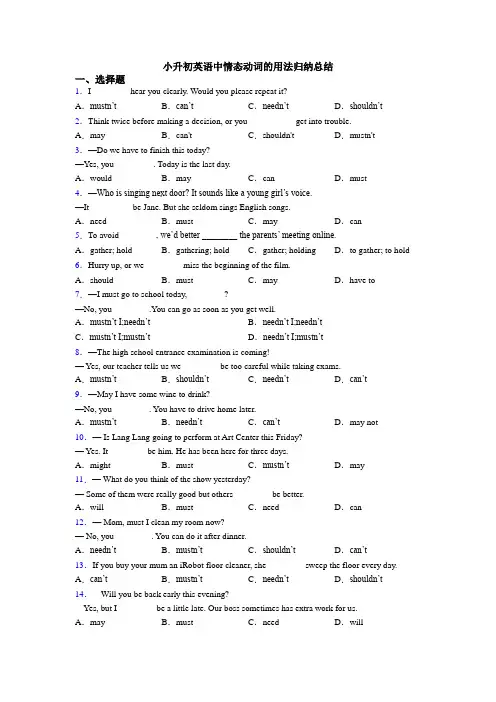
小升初英语中情态动词的用法归纳总结一、选择题1.I ________ hear you clearly. Would you please repeat it?A.mustn’t B.can’t C.needn’t D.shouldn’t 2.Think twice before making a decision, or you __________ get into trouble.A.may B.can't C.shouldn't D.mustn't 3.—Do we have to finish this today?—Yes, you ________ . Today is the last day.A.would B.may C.can D.must 4.—Who is singing next door? It sounds like a young girl’s voice.—It _________ be Jane. But she seldom sings English songs.A.need B.must C.may D.can5.To avoid ________, we’d better ________ the parents’ meeting online.A.gather; hold B.gathering; hold C.gather; holding D.to gather; to hold 6.Hurry up, or we ________ miss the beginning of the film.A.should B.must C.may D.have to7.—I must go to school today, ________?—No, you ________.You can go as soon as you get well.A.mustn’t I;needn’t B.needn’t I;needn’tC.mustn’t I;mustn’t D.needn’t I;mustn’t8.—The high school entrance examination is coming!— Yes, our teacher tells us we ________ be too careful while taking exams.A.mustn’t B.shouldn’t C.needn’t D.can’t 9.—May I have some wine to drink?—No, you ________. You have to drive home later.A.mustn’t B.needn’t C.can’t D.may not 10.— Is Lang Lang going to perform at Art Center this Friday?— Yes. It ________ be him. He has been here for three days.A.might B.must C.mustn’t D.may11.— What do you think of the show yesterday?— Some of them were really good but others ________ be better.A.will B.must C.need D.can12.— Mom, must I clean my room now?— No, you ________. You can do it after dinner.A.needn’t B.mustn’t C.shouldn’t D.can’t13.If you buy your mum an iRobot floor cleaner, she ________ sweep the floor every day. A.can’t B.mustn’t C.needn’t D.shouldn’t 14.---Will you be back early this evening?---Yes, but I ________ be a little late. Our boss sometimes has extra work for us.A.may B.must C.need D.will15.—Amy, I hear you've got many foreign coins._______ I have a look?—Of course, I'll fetch them for you.A.May B.MustC.Should D.Need16.When I was young, my father ___________ take me to climb the hill which was not far from our house.A.may B.must C.would D.should17.You ______ pay too much attention to your pronunciation, as it is so important in the oral (口头的) test.A.shouldn’t B.mustn’t C.can’t D.needn’t 18.—Shall we go camping this summer holiday?—Nothing________be better.A.should B.could C.must D.may19.My bike was broken yesterday,so I____walk home.A.might B.had to C.must D.could 20.—There is a knock at the door.—It ________ be my mom. She always comes back home at this time.A.may B.may not C.must D.can’t 21.—Seventy dollars for such a dress! You ________ be joking!—I’m serious. It’s made of silk from Hangzhou.A.must B.need C.will D.can22.You _________ smoke here! Look at the sign. It says "No smoking".A.needn't B.mustn't C.can D.may23.We've discussed every detail of this plan and have got everything ready. But still something ________ go wrong. We still have to be very careful.A.must B.should C.would D.may24.—Suzy described every detail of the accident just now.—Her memory ________ be completely back.A.shall B.need C.must D.could25.—Is that Mr Zhou?—It ________ be him. He has gone to Beijing.A.can B.may C.can’t D.shouldn’t 26.Most young people like shopping online because they ________ spend much time going from shop to shop.A.needn’t B.can’t C.mustn’t D.shouldn’t 27.—In China, many parents complain that their children have to stay up late to do the homework.—Don’t worry. The government has realized the problem. I’m sure there ________ be good news soon.A.can B.should C.need D.must28.You ________ pay too much attention to protecting yourself if you plan to go abroad. A.mustn’t B.can’t C.shouldn’t D.needn’t29.—________ I see your ID card? We have to check your personal information.—Sure. Here you are.A.May B.Need C.Should D.Must30.—Shall I tell him the change of the time right now?—I’m afraid you ________, otherwise he will be late for the meeting.A.can B.may C.must D.need31.—What is that young lady’s job?—She ________ be a nurse, I’m not sure.A.must B.may C.need D.would 32.—Must we stop the Japanese government discharging nuclear waste water (排放核污水) into the Pacific Ocean?—________. Because everyone should protect our earth and it is bad ________ us to eat the polluted seafood and drink the waste water.A.Yes, we can; of B.No, we mustn’t; of C.Yes, we must; for D.No, we needn’t; for 33.Sometimes smiles ________ be false, hiding other feelings like anger, fear or worry. A.should B.would C.must D.can34.You’ve got an A in the maths tes t again. You ________ be good at it.A.can B.may C.must D.should35.— The sandstorm in Beijing is so serious this year.— Yes, I wonder when we ________ worry about the air we breathe.A.can’t B.mustn’t C.needn’t D.shouldn’t 36.—Could you tell me how to renew the library books?—With pleasure. You ________ come to our desk every time. It’s easier to renew them online. A.can’t B.mustn’t C.needn’t D.shouldn’t 37.—The article says that a person’s animal sign decides his personality.—You ________ read it for f un, but don’t believe in that.A.can B.must C.shouldn’t D.needn’t 38.—How beautiful the winter jasmines (迎春花) are!—Yes. These golden-yellow flowers ________ be widely seen in my city in March.A.must B.can C.would D.should 39.—Mum, I bought some strawberries on my way home.—Oh, you’re so sweet. But the strawberries ________ be put into the fridge for freshness. A.must B.can C.may D.need40.When people are waiting at the zebra crossing, cars and buses ________ wait and let them go first.A.must B.may C.can D.need【参考答案】一、选择题1.B解析:B【详解】句意:我听不清你说什么。
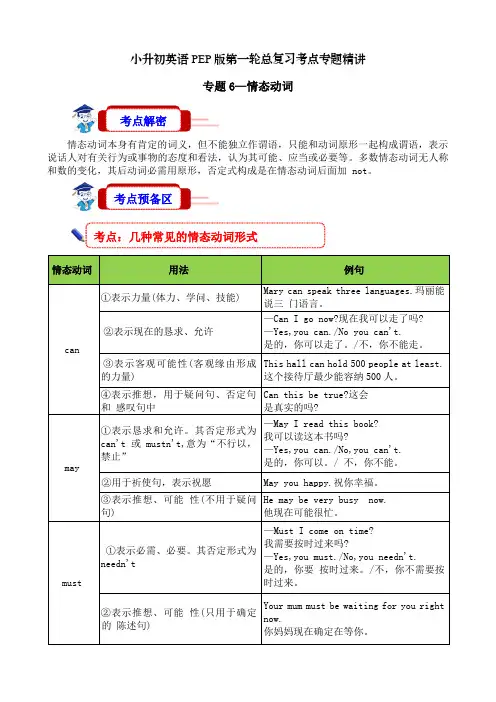
小升初英语PEP版第一轮总复习考点专题精讲专题6—情态动词情态动词本身有肯定的词义,但不能独立作谓语,只能和动词原形一起构成谓语,表示说话人对有关行为或事物的态度和看法,认为其可能、应当或必要等。
多数情态动词无人称和数的变化,其后动词必需用原形,否定式构成是在情态动词后面加 not。
情态动词用法例句can ①表示力量(体力、学问、技能)Mary can speak three languages.玛丽能说三门语言。
②表示现在的恳求、允许—Can I go now?现在我可以走了吗?—Yes,you can./No you can't.是的,你可以走了。
/不,你不能走。
③表示客观可能性(客观缘由形成的力量)This hall can hold 500 people at least.这个接待厅最少能容纳500人。
④表示推想,用于疑问句、否定句和感叹句中Can this be true?这会是真实的吗?may ①表示恳求和允许。
其否定形式为can't或mustn't,意为“不行以,禁止”—May I read this book?我可以读这本书吗?—Yes,you can./No,you can't.是的,你可以。
/ 不,你不能。
②用于祈使句,表示祝愿May you happy.祝你幸福。
③表示推想、可能性(不用于疑问句)He may be very busy now.他现在可能很忙。
must①表示必需、必要。
其否定形式为needn't—Must I come on time?我需要按时过来吗?—Yes,you must./No,you needn't.是的,你要按时过来。
/不,你不需要按时过来。
②表示推想、可能性(只用于确定的陈述句)Your mum must be waiting for you rightnow.你妈妈现在确定在等你。
考点解密考点预备区考点:几种常见的情态动词形式have to 表示客观需要做的事情,意思是“必需,不得不”。
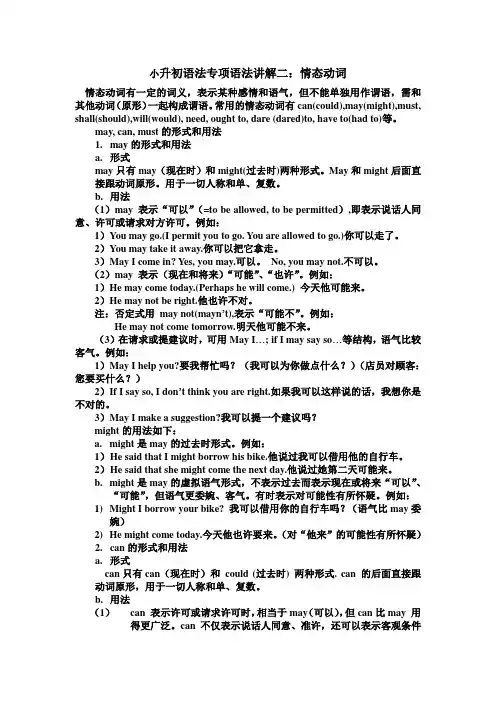
小升初语法专项语法讲解二:情态动词情态动词有一定的词义,表示某种感情和语气,但不能单独用作谓语,需和其他动词(原形)一起构成谓语。
常用的情态动词有can(could),may(might),must, shall(should),will(would), need, ought to, dare (dared)to, have to(had to)等。
may, can, must的形式和用法1.may的形式和用法a.形式may只有may(现在时)和might(过去时)两种形式。
May和might后面直接跟动词原形。
用于一切人称和单、复数。
b.用法(1)may 表示“可以”(=to be allowed, to be permitted),即表示说话人同意、许可或请求对方许可。
例如:1)You may go.(I permit you to go. You are allowed to go.)你可以走了。
2)You may take it away.你可以把它拿走。
3)May I come in? Yes, you may.可以。
No, you may not.不可以。
(2)may 表示(现在和将来)“可能”、“也许”。
例如:1)He may come today.(Perhaps he will come.) 今天他可能来。
2)He may not be right.他也许不对。
注:否定式用may not(mayn’t),表示“可能不”。
例如:He may not come tomorrow.明天他可能不来。
(3)在请求或提建议时,可用May I…; if I may say so…等结构,语气比较客气。
例如:1)May I help you?要我帮忙吗?(我可以为你做点什么?)(店员对顾客:您要买什么?)2)If I say so, I don’t think you are right.如果我可以这样说的话,我想你是不对的。
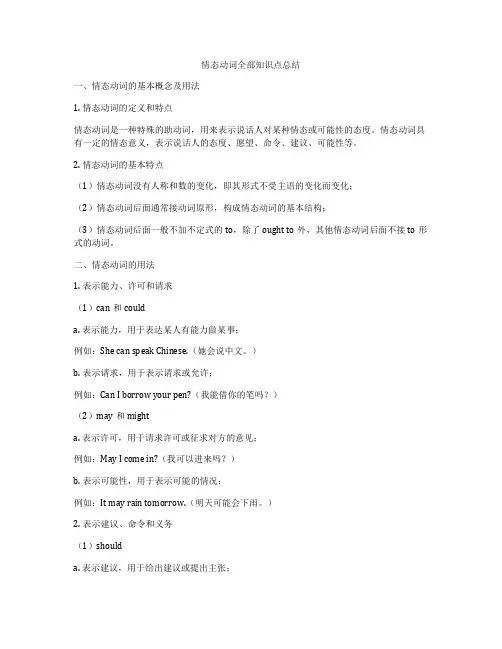
情态动词全部知识点总结一、情态动词的基本概念及用法1. 情态动词的定义和特点情态动词是一种特殊的助动词,用来表示说话人对某种情态或可能性的态度。
情态动词具有一定的情态意义,表示说话人的态度、愿望、命令、建议、可能性等。
2. 情态动词的基本特点(1)情态动词没有人称和数的变化,即其形式不受主语的变化而变化;(2)情态动词后面通常接动词原形,构成情态动词的基本结构;(3)情态动词后面一般不加不定式的to,除了ought to外,其他情态动词后面不接to形式的动词。
二、情态动词的用法1. 表示能力、许可和请求(1)can和coulda. 表示能力,用于表达某人有能力做某事;例如:She can speak Chinese.(她会说中文。
)b. 表示请求,用于表示请求或允许;例如:Can I borrow your pen?(我能借你的笔吗?)(2)may和mighta. 表示许可,用于请求许可或征求对方的意见;例如:May I come in?(我可以进来吗?)b. 表示可能性,用于表示可能的情况;例如:It may rain tomorrow.(明天可能会下雨。
)2. 表示建议、命令和义务(1)shoulda. 表示建议,用于给出建议或提出主张;例如:You should see a doctor.(你应该去看医生。
)b. 表示义务,用于表示责任或义务;例如:We should obey the law.(我们应该遵守法律。
)(2)ought toa. 表示责任或义务,用于表示应该做的事情;例如:You ought to apologize to her.(你应该向她道歉。
)3. 表示可能性和必然性(1)musta. 表示必然性,用于表示肯定的推断或必然的结论;例如:He must be at home now.(他现在一定在家。
)b. 表示义务,用于表示应遵守的规定或责任;例如:Students must wear school uniforms.(学生必须穿校服。

小升初英语情态动词——shall
情态动词--shall
shall作为情态动词用于第二、三人称
可表示说话人给对方的"命令"、"警告"、"允诺"、"威胁"等概念。
如:
You shall do it,whether you want to or not. 不管你愿意不愿意,你必须做这项工作。
(命令)
You shall have the book as soon as I finish it.这本书我一看完就给你。
(允诺)
You shall pay for it.你一定会受到惩罚的。
(威胁)
在疑问句中,情态动词shall用于第一、三人称
表示说话人征求对方的意见或向对方请示。
如:
What shall I do now? 我现在该做什么?
Shall we go for a walk? 我们去散步好吗?
Shall he come tomorrow? 你要他明天来吗?。
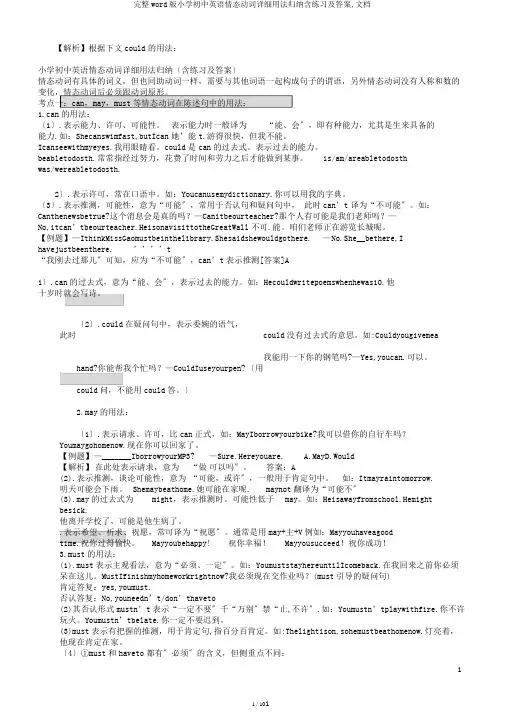
【解析】根据下文could的用法:小学初中英语情态动词详细用法归纳〔含练习及答案〕情态动词有具体的词义,但也同助动词一样,需要与其他词语一起构成句子的谓语,另外情态动词没有人称和数的变化,情态动词后必须跟动词原形。
考点一:can,may,must 等情态动词在陈述句中的用法:1.can的用法:〔1〕.表示能力、许可、可能性。
表示能力时一般译为“能、会〞,即有种能力,尤其是生来具备的能力.如:Shecanswimfast,butIcan 她’能t.游得很快,但我不能。
Icanseewithmyeyes.我用眼睛看。
could是can的过去式。
表示过去的能力。
beabletodosth.常常指经过努力,花费了时间和劳力之后才能做到某事。
is/am/areabletodosthwas/wereabletodosth.2〕.表示许可,常在口语中。
如:Youcanusemydictionary.你可以用我的字典。
〔3〕.表示推测,可能性,意为“可能〞,常用于否认句和疑问句中,此时can’t译为“不可能〞。
如:Canthenewsbetrue?这个消息会是真的吗?—Canitbeourteacher?那个人有可能是我们老师吗?—No,itcan’tbeourteacher.HeisonavisittotheGreatWall不可.能。
咱们老师正在游览长城呢。
【例题】—IthinkMissGaomustbeinthelibrary.Shesaidshewouldgothere. —No.She__bethere,I havejustbeenthere. ’’’’t“我刚去过那儿〞可知,应为“不可能〞,can’t表示推测[答案]A1〕.can的过去式,意为“能、会〞,表示过去的能力。
如:Hecouldwritepoemswhenhewas10.他十岁时就会写诗。
〔2〕.could在疑问句中,表示委婉的语气,此时could没有过去式的意思。
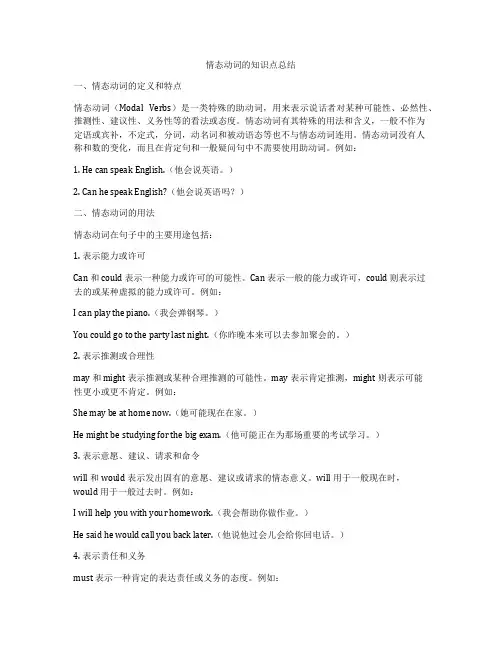
情态动词的知识点总结一、情态动词的定义和特点情态动词(Modal Verbs)是一类特殊的助动词,用来表示说话者对某种可能性、必然性、推测性、建议性、义务性等的看法或态度。
情态动词有其特殊的用法和含义,一般不作为定语或宾补,不定式,分词,动名词和被动语态等也不与情态动词连用。
情态动词没有人称和数的变化,而且在肯定句和一般疑问句中不需要使用助动词。
例如:1. He can speak English.(他会说英语。
)2. Can he speak English?(他会说英语吗?)二、情态动词的用法情态动词在句子中的主要用途包括:1. 表示能力或许可Can 和 could 表示一种能力或许可的可能性。
Can 表示一般的能力或许可,could 则表示过去的或某种虚拟的能力或许可。
例如:I can play the piano.(我会弹钢琴。
)You could go to the party last night.(你昨晚本来可以去参加聚会的。
)2. 表示推测或合理性may 和 might 表示推测或某种合理推测的可能性。
may 表示肯定推测,might 则表示可能性更小或更不肯定。
例如:She may be at home now.(她可能现在在家。
)He might be studying for the big exam.(他可能正在为那场重要的考试学习。
)3. 表示意愿、建议、请求和命令will 和 would 表示发出固有的意愿、建议或请求的情态意义。
will 用于一般现在时,would 用于一般过去时。
例如:I will help you with your homework.(我会帮助你做作业。
)He said he would call you back later.(他说他过会儿会给你回电话。
)4. 表示责任和义务must 表示一种肯定的表达责任或义务的态度。
例如:You must complete the task by tomorrow.(你必须在明天前完成任务。
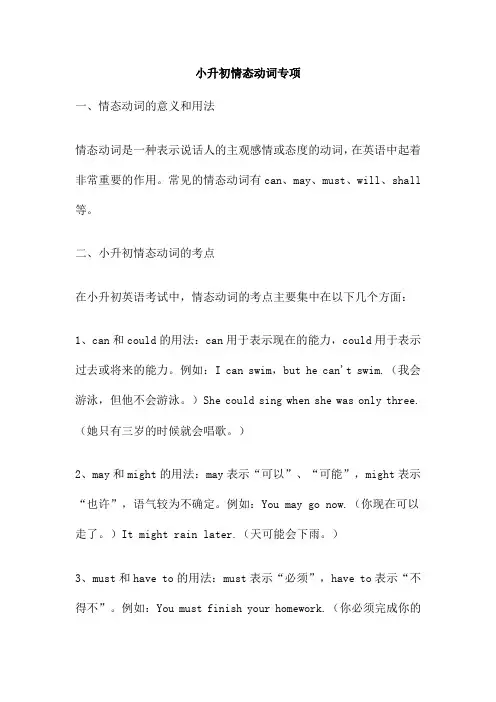
小升初情态动词专项一、情态动词的意义和用法情态动词是一种表示说话人的主观感情或态度的动词,在英语中起着非常重要的作用。
常见的情态动词有can、may、must、will、shall 等。
二、小升初情态动词的考点在小升初英语考试中,情态动词的考点主要集中在以下几个方面:1、can和could的用法:can用于表示现在的能力,could用于表示过去或将来的能力。
例如:I can swim,but he can't swim.(我会游泳,但他不会游泳。
)She could sing when she was only three.(她只有三岁的时候就会唱歌。
)2、may和might的用法:may表示“可以”、“可能”,might表示“也许”,语气较为不确定。
例如:You may go now.(你现在可以走了。
)It might rain later.(天可能会下雨。
)3、must和have to的用法:must表示“必须”,have to表示“不得不”。
例如:You must finish your homework.(你必须完成你的作业。
)I have to go to school today.(我今天必须去上学。
)4、will和shall的用法:will表示将来的一般意向,shall用于第一人称的问句中,用来征求对方的意见。
例如:What will you do tomorrow?(明天你会做什么?)Shall we go to the park?(我们可以去公园吗?)5、should和would的用法:should表示“应该”,would表示过去的某个时间点的意向或过去的习惯。
例如:You should eat more vegetables.(你应该多吃蔬菜。
)He would often go fishing on weekends.(他经常在周末去钓鱼。
)A.既;又B.不仅;而且C.因为;所以D.虽然;但是其实——其实他并不想去看电影。

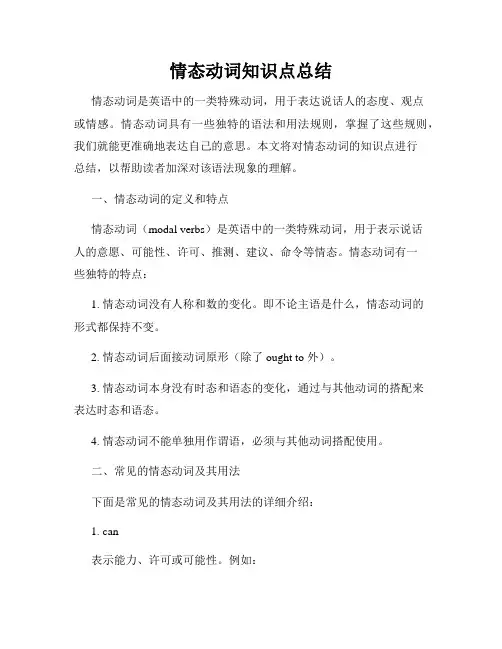
情态动词知识点总结情态动词是英语中的一类特殊动词,用于表达说话人的态度、观点或情感。
情态动词具有一些独特的语法和用法规则,掌握了这些规则,我们就能更准确地表达自己的意思。
本文将对情态动词的知识点进行总结,以帮助读者加深对该语法现象的理解。
一、情态动词的定义和特点情态动词(modal verbs)是英语中的一类特殊动词,用于表示说话人的意愿、可能性、许可、推测、建议、命令等情态。
情态动词有一些独特的特点:1. 情态动词没有人称和数的变化。
即不论主语是什么,情态动词的形式都保持不变。
2. 情态动词后面接动词原形(除了 ought to 外)。
3. 情态动词本身没有时态和语态的变化,通过与其他动词的搭配来表达时态和语态。
4. 情态动词不能单独用作谓语,必须与其他动词搭配使用。
二、常见的情态动词及其用法下面是常见的情态动词及其用法的详细介绍:1. can表示能力、许可或可能性。
例如:- I can swim.(我会游泳。
)- Can I borrow your pen?(我能借用你的笔吗?)- It can be difficult to learn a new language.(学习一门新语言可能会很困难。
)2. could表示过去或虚拟的能力、许可或可能性。
例如:- When I was young, I could run very fast.(当我年轻的时候,我跑得很快。
)- If I had more time, I could study abroad.(如果我有更多时间,我可以出国留学。
)- Could you help me with this problem?(你能帮我解决这个问题吗?)3. may表示可能性、许可或问询。
例如:- It may rain tomorrow.(明天可能会下雨。
)- May I use your phone?(我可以用一下你的手机吗?)- May I ask you a question?(我可以问你一个问题吗?)4. might表示可能性,用法与 may 相似。
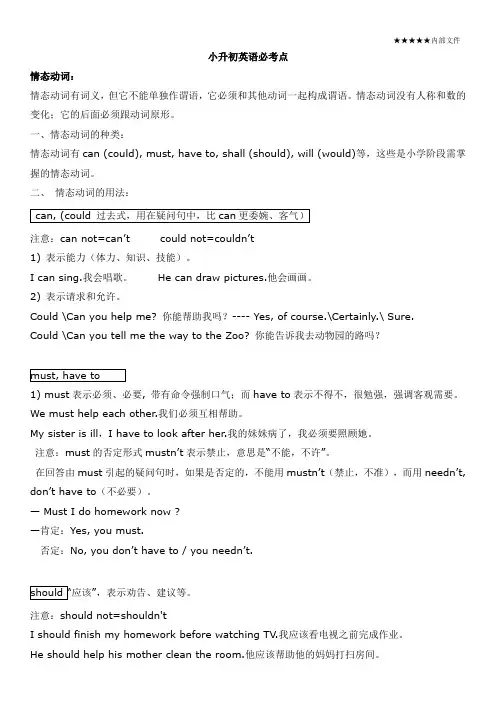
小升初英语必考点情态动词:情态动词有词义,但它不能单独作谓语,它必须和其他动词一起构成谓语。
情态动词没有人称和数的变化;它的后面必须跟动词原形。
一、情态动词的种类:情态动词有can (could), must, have to, shall (should), will (would)等,这些是小学阶段需掌握的情态动词。
二、情态动词的用法:注意:can not=can’t could not=couldn’t1) 表示能力(体力、知识、技能)。
I can sing.我会唱歌。
He can draw pictures.他会画画。
2) 表示请求和允许。
Could \Can you help me? 你能帮助我吗?---- Yes, of course.\Certainly.\ Sure.Could \Can you tell me the way to the Zoo? 你能告诉我去动物园的路吗?1) must表示必须、必要, 带有命令强制口气;而have to表示不得不,很勉强,强调客观需要。
We must help each other.我们必须互相帮助。
My sister is ill,I have to look after her.我的妹妹病了,我必须要照顾她。
注意:must的否定形式mustn’t表示禁止,意思是“不能,不许”。
在回答由must引起的疑问句时,如果是否定的,不能用mustn’t(禁止,不准),而用needn’t, don’t have to(不必要)。
— Must I do homework now ?—肯定:Yes, you must.否定:No, you don’t have to / you needn’t.应该”,表示劝告、建议等。
注意:should not=shouldn'tI should finish my homework before watching TV.我应该看电视之前完成作业。
小升初英语语法讲解小升初英语语法精选讲解小升初英语语法大全:现在完成进行时现在完成进行的形式I / we / they have been + 动词的现在分词He / she / it has been + 动词的现在分词现在完成进行的功用1) 表示一个在过去开始而在最近刚刚结束的行动,如:Ann is very tired. She has been working hard.Why are you clothes so dirty? What have you been doing?2) 表示一个从过去开始但仍在进行的行动,如:It has been raining for two hours. (现在还在下)Jack hasn’t been feeling very well recently.3) 表示一个从过去开始延续到现在,可以包括现在在内的一个阶段内,重复发生的行动,如:She has been playing tennis since she was eight.4) 现在完成时强调动作行为的结果、影响,而现在完成进行时只强调动作行为本身,如:Tom’s hands are very dirty. He has been repairing the car.The car is going again now. Tom has repaired it.注意:现在完成时有否定结构、而现在完成进行时没有否定结构。
现在完成时态可表示做完的时期以及已有的经验、但现在完成进行时不可以。
现在完成进行时的否定结构在当代英语中,现在完成进行时有时也可用否定结构。
如:Since that unfortunate accident last week, I haven’t been sleeping at all well. 自从上周发生了那次不幸事故之后,我一直睡得很不好.He hasn’t been working for me and I haven’t has that much contact with him. 他并没有给我工作过,我和他没有过那许多接触。
英语语法教学微课教案(情态动词can和could)第一章:情态动词can和could的概述1.1 情态动词can的用法表示能力表示允许表示请求表示可能性1.2 情态动词could的用法表示过去的能力表示可能性表示礼貌的请求第二章:情态动词can和could的构成和发音2.1 情态动词can的构成和发音构成:can + 动词原形发音:[kæn]2.2 情态动词could的构成和发音构成:could + 动词原形发音:[kʊd]第三章:情态动词can和could的句子结构3.1 情态动词can的句子结构主语+ can + 动词原形+ 其他3.2 情态动词could的句子结构主语+ could + 动词原形+ 其他第四章:情态动词can和could的举例练习4.1 能力方面的举例I can swim.She can speak English.4.2 允许方面的举例You can e in.They can't watch the movie.4.3 请求方面的举例Could you help me?Can you pass the salt?4.4 可能性方面的举例It can rn today.There could be a traffic jam.第五章:情态动词can和could的运用5.1 情态动词can的运用日常生活中表示能力、允许、请求和可能性。
5.2 情态动词could的运用过去表示能力、可能性、礼貌请求。
第六章:情态动词can和could的时态搭配6.1 情态动词can的时态搭配can + 动词原形:一般现在时could + 动词原形:一般过去时6.2 情态动词could的时态搭配could + 动词原形:过去能力、可能性、礼貌请求第七章:情态动词can和could的否定句7.1 情态动词can的否定句主语+ can't + 动词原形+ 其他主语+ cannot + 动词原形+ 其他7.2 情态动词could的否定句主语+ couldn't + 动词原形+ 其他主语+ could not + 动词原形+ 其他第八章:情态动词can和could的疑问句8.1 情态动词can的疑问句Could + 主语+ 动词原形+ 其他?Can + 主语+ 动词原形+ 其他?8.2 情态动词could的疑问句Could + 主语+ 动词原形+ 其他?Can + 主语+ 动词原形+ 其他?第九章:情态动词can和could的转移句型9.1 情态动词can的转移句型主体句:主语+ can + 动词原形宾语从句:主语+ can + that/if + 宾语从句9.2 情态动词could的转移句型主体句:主语+ could + 动词原形宾语从句:主语+ could + that/if + 宾语从句第十章:情态动词can和could的综合练习10.1 情景对话练习设计不同场景,让学生运用情态动词can和could进行对话。
人教新课标小升初英语语法零基础:情态动词如何表猜测
小升初英语语法零基础:情态动词如何表猜测情态动词用于肯定猜测
1. must用于肯定句,表示较有把握的推测,意为“准是,一定”。
后面接动词原形,表示对现在的推测。
如:
-I've had no sleep for 48 hours. 我已经48小时没睡觉了。
-You must be very tired. 你一定很累了。
2. should用于肯定句中,语气次之,意为“很可能,应该”,指按常理推测。
如:
They left yesterday. They should be home by now. 他们昨天就离开了,现在该到家了。
3. can用在肯定句中,表示理论上的可能性。
如:
Smoking can cause cancer. 吸烟有可能引起癌症。
4. may用在肯定句中,表示对现在把握不大的推测,意为“也许,可能”。
如:
Don't play with the knife. You may cut yourself. 不要玩小刀,你可能会伤了自己。
5. could, might也可表示推测意义,常用在过去时态中;但在某些场合下,为了使语气更缓
呢?是珍妮吗?
The money has disappeared! Who could have taken it? 钱不见了!会是谁拿去的呢?
Oh, how could you be so stupid? 哦,你怎么会这么愚蠢呢?。
小升初英语情态动词may、might情态动词--may, mightmay表示"允许"或"请求"May I come in? -Yes,do. 我可以进来吗?--请进。
May I borrow you raincoat? 我可以借用你的雨衣吗?You may go now. 你现在可以走了。
You may ring us up any time during office hours.在办公时间你可以随时给我们打电话。
[注] may表示"允许"的否定形式是must not(不应该,不许可)。
如:May I take this book out of the reading-room? -No,you mustn't. 我可以把这本书拿出阅览室吗? --不行。
may还可表示说话人的猜测,认为某一事情"或许"或"可能"发生We may call on you this evening.我们也许今天晚上来看你。
She may not go to the concert tonight.今晚她可能不去听音乐会了。
The news may or may not be true. 消息也许是真的,也许不是真的。
[注] may用在感叹句中可表示祝愿,愿望如:May you succeed.祝你成功。
May you have a pleasant journey.一路平安。
might为may的过去式The speaker said we might ask him any question.作报告的人说我们可以向他提任何问题。
He said he might go to the Palace Museum on Sunday. 他说他星期天可能去参观故宫博物院。
[注一]night也可代替may,表示现在,但语气较为婉转客气或更加不肯定。